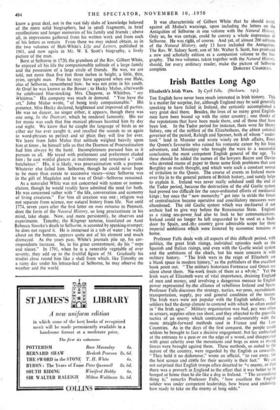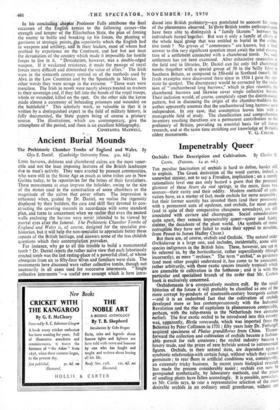Irish Battles Long Ago
Elizabeth's Irish Wars. By Cyril Falls. (Methuen. 2ss.) THE English have never been much interested in Irish history. This is a matter for surprise, for, although England may be said generally speaking to have failed in Ireland, she certainly accomplished a very great deal there. Besides, the lives of so many great. English- men have been bound up with the sister country ; one thinks of the reputations that have been made there, and of those that have been lost. In the Tudor period for instance, there were Sir Henry Sidney, one of the noblest of the Elizabethans, the ablest colonial governor of the period, Raleigh and Spenser, both of whom " under- took " land in Munster and wrote wisely on Irish affairs, Essex the Queen's favourite who ruined his romantic career by. his Irish adventure, and Mountjoy who brought the wars to a successful conclusion, the most competent English general of the age. To these should be added the names of the lawyers Bacon and Davies who devoted reams of paper to those same Irish problems that cost Burghley so much thought, and which were such a constant source of irritation to the Queen. The course of events in Ireland more- over fits in to the general pattern of British history, and surely helps to explain it. Ireland was never really subdued until the end of the Tudor period, because the destruction of the old Gaelic system had proved too difficult-for the unco-ordinated efforts of mediaeval kings ; but once the "new monarchy" got into ts stride the forces of centralisation became operative and conciliatory measures were abandoned. The old Gaelic system which was mediaeval if not archaic had to give way before the Renaissance State. England as a rising sea-power, had also to look to her communications. Ireland could no longer be left unguarded to be used as a back- door by Spain, and ,the country gave admirable scope for those imperial ambitions Which were fostered by economic tensions at home.
Professor Falls deals with all aspects of this difficult period, with politics, the great Irish risings, individual episodes such as the Spanish and Italian risings, and even with the Gaelic social system and the ambitions of the chiefs, but his main 'concern is with military history. "The Irish wars in the reign of Elizabeth are a blank space in modern history," as the publishers of this excellent book point out. "The military historians Fortescue and Oman are silent about them. No work treats of them as a whole." Yet the Irish wars of Elizabeth were of vital importance, draining England of men and money, and involving a dangerous menace to English power represented by-the alliance of rebellious Ireland and Spain. Professor Falls discusses the strategy, tactics, we? pons, recruitment, transportation, supply, pay and general condition of the troops. The Irish wars were not popular with the English soldiery. The soldiers had the damp climate to contend with which so often ended in "the Irish ague." Military organisation was bad, pay was often in arrears, supplies often ran short, and they objected to the guerrilla tactics of an enemy which contrasted so unfavourably with the more straight-forward methods used in France and the I,ow Countries. As in the days of the first conquest, the people could seldom be brought to face a decisive engagement. but lay ambushed at the entrance to a pass or on the edge of a wood, and disappeared with great celerity over the mountains and bogs as soon as strong forces were brought against them. These methods, so suited to the nature of the country, were regarded by the English as cowardly. "They hold it no dishonour," wrote an official, to run away, for the best sconce atid attle for their security is their feet." We are not surprised that English troops often deserted to 'I-e enemy, or that there was a proverb in england to the effect that it was better to be hanged at home than to die like a dog in Ireland. ' " The astonishing thing is," remarks Professor Falls, "how excellent the English soldier was under competent leadership, how brave and enduring, how ready to take on the enemy at long odds." In his 'concluding 1-..ahssAer :Professor Falls attributes the final successes of the English armies to the following causes—the strength and temper of the Elizabethan State, the plan of forcing the enemy to battle and breaking up his forces, the planting of garrisons at strategic pointsajm superiority which the English had in weapons and artillery, ea- hi their leaders, most of whom had profited by experience on the 'Continent, and last but not least the devastation of the country which made it impossible for hostile forces to live in it. "Devastation, however, was a double-edged weapon. If it weakened resistance, it made the passage of royal forces more difficult and diminished the value of allies." The Irish wars in the sixteenth century remind us of the methods used by Alva in the Low Countries and by the Spaniards in Mexico. In other words they were savage in the extreme. "These wars were merciless. The Irish in revolt were nearly always treated as traitors to their sovereign and, if they fell into the hands of the royal troops, whole or wounded, killed on the spot. On the other side the kerne made almost a ceremony of ,beheading prisoners and wounded on the battlefield" This scholarly work, so valuable in that it is written by a distinguished expert in the field of military history, is fully documented, the State papers being of course a primary source. The illustrations, which are contemporary, give the atmosphere of the period, and there is an excellent bibliography.
CONSTANTIA MAXWELL.



















































 Previous page
Previous page